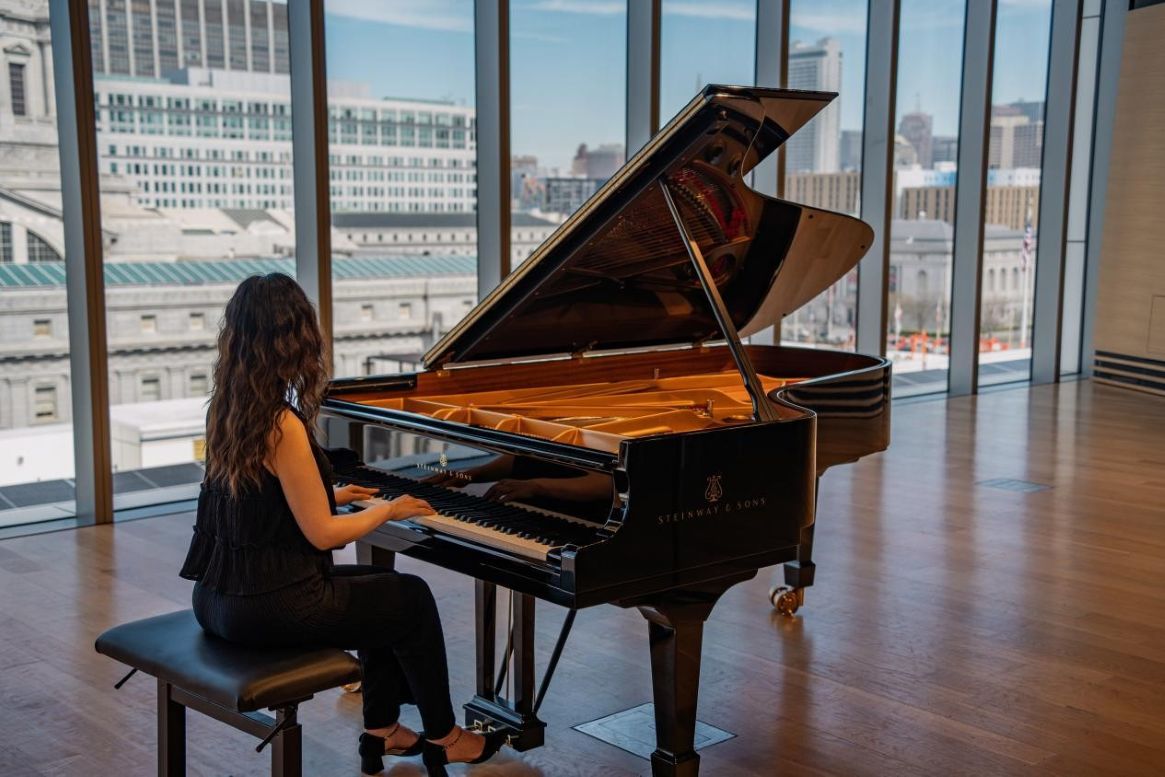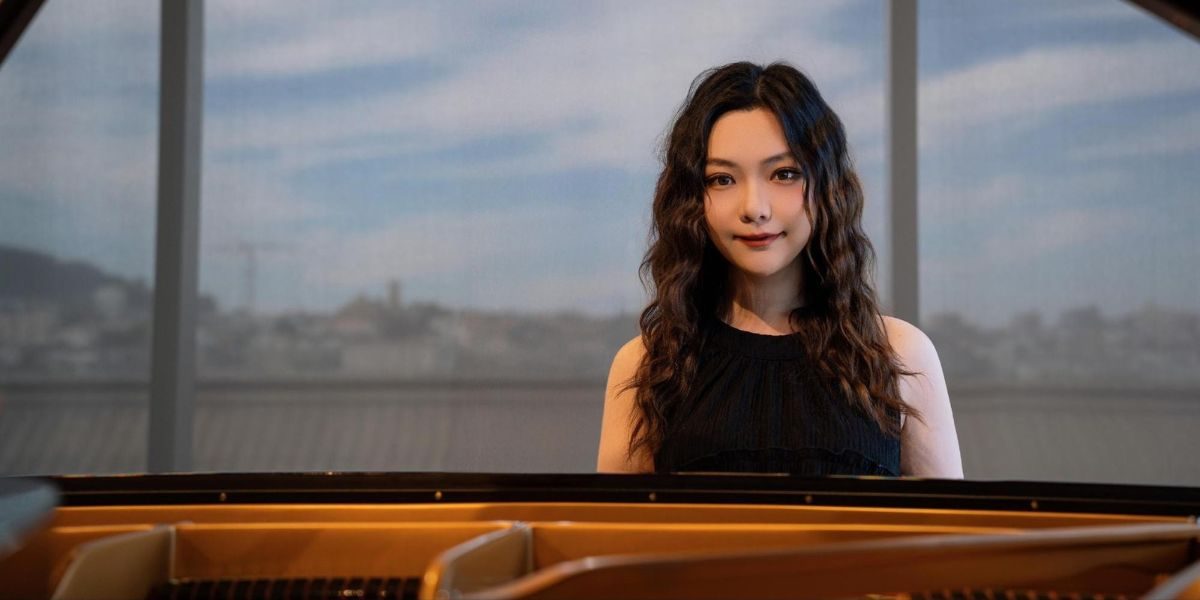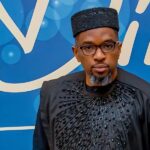By: Brooklyn Ellis
Not long ago this month, at the Barbro Osher Recital Hall of the San Francisco Conservatory of Music, a noteworthy musical event unfolded. Wang Niyang’s fingers dance across the piano keys, simultaneously supporting Rory’s First Year Master’s Recital with her piano performance throughout the concert. As the same in the bustling cultural landscape of San Francisco, where innovation meets tradition, Wang Niyang stands out in classical music. Her journey—from the conservatories of China to the prestigious stages of the United States—exemplifies the transformative power of music as a bridge between cultures. As an illustrious pianist, cross-cultural artist, and cultural ambassador, Wang has demonstrated exceptional technical skill and emotional depth in her craft while also contributing to the evolving role of classical musicians in global dialogue.
A Symphony of Dedication and Talent
Born in 1998 in China, Wang Niyang’s musical journey began at the age of three under the guidance of renowned professors Wang Nannan and Jian Yi at the Central Conservatory of Music. By seven, she had embraced the guzheng, a traditional Chinese zither, while simultaneously honing her skills on the piano. This dual foundation in Eastern and Western music became the cornerstone of her unique artistic voice.
Her formal education at the Shenyang Conservatory of Music and her work as an accompanist at the China Conservatory of Music sharpened her ability to blend precision with emotion. But it was her leap across the Pacific to pursue a Master’s in Collaborative Piano at the San Francisco Conservatory of Music in 2022 that marked a turning point. Armed with scholarships from SFCM, Mannes School of Music, and Longy School of Music, Wang embarked on a mission to merge her cultural vision with contemporary artistry.
Elevating Collaborative Piano to New Heights
At the San Francisco Conservatory of Music, Wang quickly gained recognition as a collaborative pianist and artistic director. Her ability to adapt to diverse instruments—from violin and cello to harp and oboe—showcased her versatility. Notable collaborations include performances with violinist Sydney Hartwick, cellist Octavio Mujica, and harpist Vicki Chen, each partnership celebrated for its seamless harmony and emotional resonance.
In April 2023, Wang held her debut collaborative piano recital at the San Francisco Conservatory of Music, a performance lauded for its technical brilliance and interpretative depth, which showed how her playing “breathed new life into classical compositions.” Since arriving at the San Francisco Conservatory of Music in 2022, Wang has participated in over 30 major performances, an astonishing output that showcases both her stamina and artistic range. But what truly sets her apart is how she’s expanding the collaborative pianist’s role from accompanist to co-creator.

Cultural Diplomacy Through Music
Wang’s impact extends beyond the concert hall. In October 2024, she performed The Song of the Yue People, a traditional Chinese piece, for Professor Wang Chuanyue, who is also a master’s supervisor at the Central Conservatory of Music, the director of the Youth Singer Academic Committee of the Ministry of Culture’s Traditional Culture Promotion Association, the vice chairman of the Xicheng District Musicians Association, a contracted singer at the San Francisco Opera House, and a member of the Melora and Adler International Artist Training Program at the San Francisco Opera House, during his visit to the San Francisco Conservatory of Music. This moment encapsulated her role as a cultural bridge, introducing American audiences to Chinese musical traditions while infusing Western classics with Eastern sensibilities.
“That performance wasn’t just about sharing Chinese music,” Wang reflects. “It was about showing how musical traditions can converse. When we sang, you could hear centuries of Chinese storytelling meeting Western harmonic language.”
Her work at ViBO Music School and Mimi Learning Institution further underscores her commitment to cross-cultural education. There, she continued to inspire young musicians with her expertise, which further demonstrated her commitment to fostering musical excellence in the next generation.

Wang Niyang and Professor Wang Chuanyue
Innovating the Future of Classical Music
Wang’s approach to the collaborative piano is innovative. She treats each partnership as a dialogue, whether accompanying a vocalist or an instrumentalist. Her recent participation in a German Austrian Art Song Concert and her role in Rory’s First Year Master’s Recital highlight her ability to traverse genres and eras with equal finesse.
“Classical music thrives when it evolves,” Wang reflects. “My goal is to honor tradition while making it accessible to all—whether through teaching, performing, or cultural exchange.”
Looking ahead, Wang aims to establish a platform for East-West musical collaborations, leveraging her network in both China and the U.S. She envisions festivals, workshops, and digital projects that democratize classical music and celebrate its universal appeal. “Music is a powerful tool for connection,” she says. “In a world often divided, it always inspires emotions and resonance in our communication.”
Wang Niyang represents the power of music as both an art form and a cultural bridge. More than a virtuoso pianist, she has redefined collaborative artistry by merging Eastern and Western traditions with technical mastery and innovative vision. Her impact goes beyond performance—through education, cultural exchange, and her commitment to the evolution of music, she is helping to shape a more inclusive future for classical music. Wang’s journey demonstrates that true artistry is not just about playing notes but about creating new opportunities for the entire industry. As her influence expands, one thing is certain: she is not only part of music’s future—she is actively contributing to its development.
Published by Jeremy S.

















